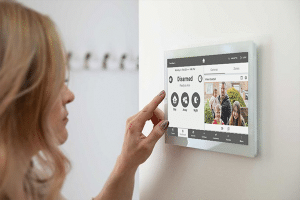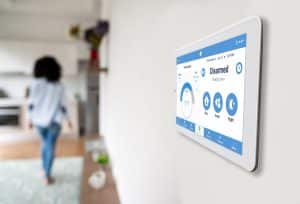Your cart is currently empty!
Category: Homeowner Tips
-

Spring Clean Your Way to a Safer Home: Essential Security & Fire Prevention Tasks
Spring is here in, bringing with it the perfect opportunity to refresh our homes. While you’re tackling dust bunnies and decluttering closets, let’s not forget some crucial cleaning tasks that directly contribute to your family’s safety and fire prevention. At EMC Security, we believe a proactive approach to home maintenance is key to peace of mind. So, grab your cleaning supplies and let’s make your home both sparkling and secure!
1. Breathe Easy, Clean Your Bathroom Exhaust Fan (Fire Prevention Focus):
That seemingly tireless fan in your bathroom works hard to combat moisture. However, over time, it becomes a magnet for dust and lint. This accumulation can restrict airflow, causing the motor to overheat and, alarmingly, become a potential fire hazard.
- The Cleaning Drill: Flip the circuit breaker for the bathroom. Carefully remove the fan cover (usually clips or screws). Use your vacuum’s brush attachment to gently remove loose dust. For stubborn buildup on the fan blades and housing, use a damp cloth with mild soap, ensuring everything is completely dry before reassembling and restoring power. Make this an annual spring cleaning must-do!
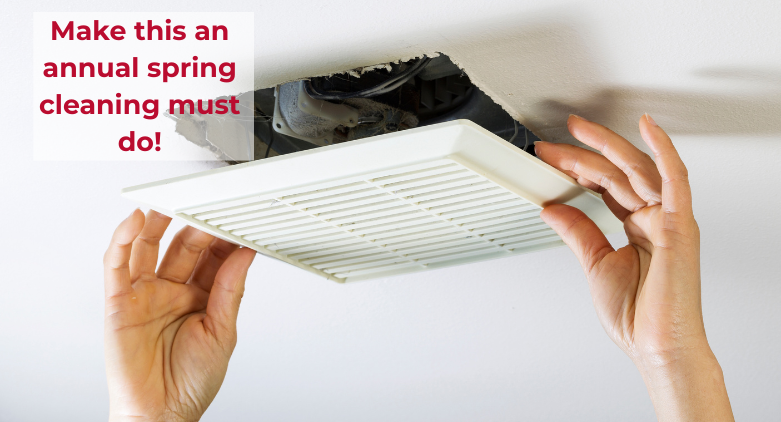
2. Creating a Fire-Safe Kitchen Through Cleaning:
The kitchen is a hub of activity, and unfortunately, a common source of house fires. A thorough spring cleaning in this area can significantly reduce risks.
- Degrease for Safety: Grease buildup on your stovetop, backsplash, microwave interior, and especially around the exhaust hood is highly flammable. Use a powerful degreaser to eliminate this hazard. Don’t forget to clean or replace your range hood filter, as it traps grease that can ignite.
- Clear the Burner Zone: Keep the area around your stovetop completely clear of flammable items like dish towels, paper towels, oven mitts, and wooden utensils. Store these safely away from heat sources.

3. Dust Off Your First Line of Defense: Smoke & Carbon Monoxide Detectors:
While not a traditional “cleaning” task, spring is the perfect reminder to give your smoke and carbon monoxide detectors some crucial attention. Dust buildup can impede their ability to detect smoke or gas effectively.
- The Simple Safety Step: Gently dust the exterior of each detector with a soft cloth. More importantly, test them! Press the test button to ensure the alarm sounds. If the batteries are old or the test fails, replace them immediately. Make it a habit to test monthly, but spring cleaning is an excellent time for a thorough check and battery refresh.
- 10-Year Rule:The National Fire Protection Association (NFPA) recommends replacing smoke alarms every 10 years from the date of manufacture.
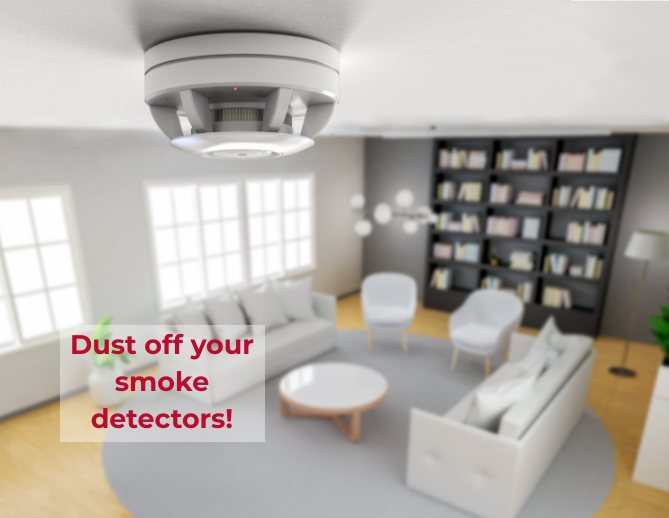
4. Secure Your Entry Points: Windows and Doors:
As you open your windows to welcome the fresh spring air, take a moment to assess their security, along with your doors.
- Smooth Operation & Secure Locks: Check that all window and door locks operate smoothly. Lubricate any that are stiff or sticking. Repair or replace any locks that are damaged or not functioning correctly.
- Window Latches & Security: Ensure window latches engage firmly. Remember that window screens are for insects, not security. Always lock windows when they are closed, even if you’re just stepping away for a moment. For sliding doors, consider adding a security bar or foot lock for extra protection.
- Frame and Hinge Check: While cleaning frames, look for any signs of damage or rot that could compromise security. Ensure door hinges are securely fastened and show no signs of weakness.

By incorporating these essential cleaning and maintenance tasks into your spring cleaning routine, you’re not just tidying up; you’re actively enhancing the safety and security of your Suwanee home. A clean home is a safer home, and taking these steps can provide greater peace of mind for you and your family.
If you have any questions about home security or want to learn more about how EMC Security can further protect your home, please don’t hesitate to contact us! Let’s make this spring a safe and secure one with fire prevention in mind.
Call us today at 770-963-0305 or >>CLICK HERE<< to schedule a call.
-

How Home Security Systems Tip the Odds in Your Favor
Imagine you’re a burglar, casing a neighborhood for an easy target. Which house are you going to skip? The one with the barking dog? Maybe. The one with the nosy neighbor? Possibly. But the one with the obvious security system? Absolutely.
Let’s talk about why and go through home security tips…
Burglars are Choosy: Think of burglars as opportunistic predators, constantly scanning for the easiest prey. They’re not interested in a challenging heist; they want a quick and quiet in-and-out operation. That’s where your home security system comes into play.
The “No Thanks” List: Studies show that a staggering 60-83% of burglars actively check for security systems and cameras before even attempting a break-in. Your alarm system, cameras, and even those simple window stickers send a clear message: “Not an easy target!“
EMC Security has countless examples of customers telling us that an intruder attempted to break-in but when the alarm sounded, they fled.
Flipping the Script: Imagine the burglar’s mindset. They’re casing your neighborhood, weighing their options. They see your house with visible security and another house without. Which one are they more likely to bypass?
The numbers tell the story: 40-60% of burglars admit they would avoid a home altogether if they spotted a security system.
The “Unwelcome Mat” Effect: Beyond the statistics, there’s the psychological impact. Security systems create a sense of unease for burglars, disrupting their plans and increasing the perceived risk of getting caught. Suddenly, your home isn’t just a potential target; it’s a potential trap.
EMC Security customers use their cameras as the first line of defense – catching the criminal on film. The powerhouse security alarm then takes over and becomes the defender at the door.
More Than Meets the Eye: Alarms and cameras are the obvious deterrents, but other security measures can also play a role. Motion-activated lights, smart locks, and even the simple act of keeping your yard well-maintained send signals that you’re a vigilant homeowner.
Don’t let your home be an easy target. Secure your peace of mind today – get a free quote for a personalized home security system! Keep these home security tips in mind!
-

Easy Wins Aren’t an Option Here: Deter Burglars with These Tips
Burglars are always looking for easy targets. They want to get in and out quickly without being caught. If you make your home a hard target, they’ll be more likely to move on to someone else’s house. Check out our tips to stay in the know.
Below are some tips for making your home a fortress against burglars:
- Install a security system. A monitored alarm system is a great deterrent to burglars. It will make them think twice about breaking into your home. Stats show a home without a security system is 3 times MORE likely to be burglarized.
- Get security cameras. Security cameras can help you deter burglars and also help you identify them if they do break in.
- Install motion-activated lights. Motion-activated lights will scare off burglars and also help you see if someone is trying to break into your home at night.
- Make sure your doors and windows are secure. All of your doors and windows should be made of strong materials and should be properly locked.
- Create the illusion that you are home. If you are going to be away from home for a while, leave some lights on and set a timer to turn on and off the TV or radio. You can also ask a neighbor to check on your house and collect your mail.
- Get a dog. Even a small dog can be a deterrent to burglars. Dogs bark and make noise, which will scare off burglars.
- Keep your valuables out of sight. Don’t leave your valuables lying around where burglars can see them. Put them in a safe place or lock them up.
- Get to know your neighbors. Having good relationships with your neighbors can help deter burglars. If you know your neighbors, you can look out for each other’s homes.
By following these tips, you can make your home a fortress against burglars. They will see that your home is a hard target and they will move on to someone else’s house.
Additional tips:
- Trim your bushes and trees. This will help to make your home more visible from the street and will make it less likely that a burglar will be able to hide.
- Keep your yard clean and tidy. This will also help to make your home more visible from the street and will make it less likely that a burglar will be able to hide.
- Install a fence. A fence can help to deter burglars and also help to keep your children and pets safe.
- Be aware of your surroundings and to trust your gut instinct. If you feel like something is not right, it probably is. Don’t be afraid to call the police if you see something suspicious.
Take the first step to protect your home and loved ones. Get a free security consultation now at 770-963-0305 or click below.
-
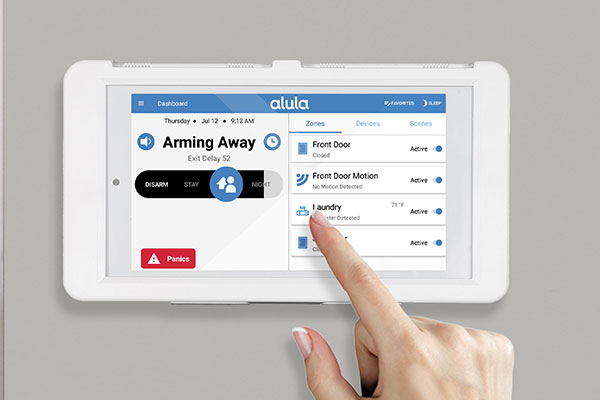
Are Security Systems Still Necessary?
With all the buzz about security cameras and video doorbells these days, you might be wondering if traditional security systems are becoming a thing of the past. After all, if your cameras can keep an eye on things, do you really need the door and window sensors, motion detectors, and alarms?
The short answer is: yes, you do. While cameras are getting more and more advanced, they’re not quite ready to replace a complete security system.
Let’s explore why.
Cameras: Great Detectives, Not So Great at Prevention
Modern cameras are pretty amazing (check out EMC Security’s selection here). They can spot movement, recognize faces, send you notifications, and store the video. Some have a siren and two-way audio to whoever’s on the other end. But they mainly react to what’s already happening.
Imagine this scenario: An intruder smashes a window. Your camera faithfully captures the act and sends you an alert. But what happens next? You’re forced to react, calling the police, but precious minutes have already been lost. The damage is done, and the sense of security is shattered.
However, it’s important to acknowledge the peace of mind that cameras can provide. In the event of an alarm trigger, you can instantly check your cameras, whether you’re at home or away. This allows you to assess the situation quickly and make informed decisions, whether it’s calling the police or simply verifying a false alarm.
Monitored Security System: The Power of Immediate Response
A professionally monitored security system does much more than just record a break-in; it acts as your round-the-clock protector, actively responding and minimizing any damage if something happens. Let’s break down how its key components work together to create this powerful shield:
Door and window sensors: These little sensors are like an invisible fence around your home. If a door or window is opened when it shouldn’t be, an alarm goes off right away, potentially scaring off intruders and sending a signal to the monitoring center.
Motion detectors: Extra eyes in the house, especially in places your cameras can’t see, motion detectors are usually placed in hallways, entryways, or other spots where someone might try to sneak in. If they sense movement, they’ll trigger an alert, giving you an early warning.
Glass break sensors: Listening for trouble, these special sensors can hear the sound of glass breaking, whether it’s a window or a glass door. So, if someone tries to smash their way in, the alarm will go off.
Keypads: Your command center and control panel for your whole system. You can use it to turn the alarm on and off, see what your cameras are seeing, and even control other smart devices in your home. And with the app on your phone, you can do all of this even when you’re not home.
Smoke and fire detectors: These give you an early warning if there’s a fire, and call authorities for you when you’re occupied getting everyone to safety (or not in the home).
Smart Home Integration: Modern security systems can also connect with other smart devices in your home, making things even more secure and convenient:
-
- Smart locks: You can lock and unlock your doors from your phone, let guests in remotely, and get notifications whenever a door is opened or closed.
- Smart thermostats: You can adjust the temperature in your home from anywhere, so it’s comfortable when you get home and you’re not wasting energy when you’re away.
- Smart lighting: Control your lights from your phone to make it look like someone’s home even when you’re not.
- Water leak sensors: These can spot leaks early on, so you can fix them before they cause major damage.
Professional Monitoring: Your 24/7 Backup
-
- Peace of Mind, Always: The monitoring center is like having someone watch over your home even when you can’t. If the alarm goes off, they’ll check in with you, and if they can’t reach you, they’ll call for help.
- When You Can’t Respond: Maybe you’re in a meeting, driving, or asleep. The monitoring center doesn’t depend on you being available. They’ll take action, even if you can’t.
The Future is Smart, and It’s Getting Smarter
While today’s security systems remain essential, the future of home security is undoubtedly intertwined with the evolution of smart cameras. We’re already seeing impressive advancements, particularly in the commercial space, and for residential, imagine a future where cameras are even more intelligent and proactive:
Instant Intervention: Cameras could directly connect with emergency services, dispatching help the moment a break-in or other threat is detected. This would eliminate precious minutes lost during the crucial early stages of an incident.
Predictive Analytics: Cameras equipped with advanced AI could analyze patterns and behaviors, potentially predicting and preventing crimes before they happen. For instance, they could identify suspicious loitering or unusual activity near your property and alert you or the authorities.
Personalized Protection: Cameras could learn your daily routines and recognize familiar faces, alerting you to any unexpected visitors or activities. This would offer a heightened sense of security tailored to your lifestyle.
Seamless Integration: Cameras could seamlessly integrate with other smart home devices, creating a unified security ecosystem. Imagine lights automatically turning on when a camera detects motion at night, or doors locking automatically when an unfamiliar face is detected.
These advancements paint a picture of a future where cameras aren’t just passive observers but active participants in keeping your home safe.
The Best of Both Worlds: A Hybrid Approach
While the future holds exciting possibilities, it’s important to remember that technology evolves gradually. For now, the most effective approach is to combine the proactive protection of a comprehensive professionally monitored security system with the real-time insights provided by security cameras.
This hybrid model offers the best of both worlds, providing immediate response, powerful deterrence, and peace of mind.
The Bottom Line:
Peace of mind is invaluable. A full security system might not be as trendy as the latest smart camera, but it offers a level of proactive protection that cameras alone just can’t match.
So, do people still need full security systems? You bet. At least for the foreseeable future, they remain a vital part of keeping your home and loved ones safe.
-
-
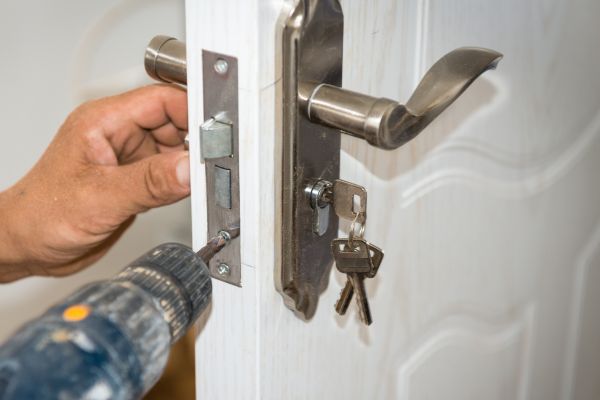
New Home Safety Checklist
- Change the locks: This is the first and most crucial step for your peace of mind. Rekey or replace all locks on exterior doors, including the garage, shed, and any side or back entrances.
- Reinforce doors: Consider adding deadbolts or reinforcing strike plates for extra security.
- Check windows: Make sure all windows lock securely and have no damage. Check for cracks or gaps in window frames and seal them.
- Garage security: If you have a garage, check the door’s functionality and ensure it locks properly. Make sure the automatic opener has a rolling code feature to prevent hacking. Consider a smart garage door opener for remote monitoring and control.
- Test existing smoke and carbon monoxide detectors: Replace batteries if needed and make sure they’re in working order on every level of your home.
- Install smoke detectors in every bedroom, outside sleeping areas, and on every level of your home, including the basement. Install carbon monoxide detectors near sleeping areas and on each level. Test them monthly and replace batteries annually.
- Locate existing fire extinguishers: Place fire extinguishers in easily accessible locations, such as the kitchen, garage, and near fireplaces. Make sure everyone in the household knows how to use them.
- Plan escape routes: Create a fire escape plan with two exits from every room, and practice it with everyone in the household.
EMC Security monitors for fire and CO at no additional monthly cost!
- Install window guards or window stops to prevent falls from elevated windows.
- Use cordless window coverings to eliminate hazards for young children.
- Secure heavy furniture to walls using anti-tip brackets or straps to prevent tipping accidents.
- Install cabinet door locks. Place all cleaners and hazardous materials high up.
- Install security gates in strategic places such as at the stairways.
- Locate main water shut-off valve: Learn how to turn off the water supply in case of a leak.
- Inspect for leaks: Check under sinks, around toilets, and in basements for any signs of water damage or leaks.
- Water heater safety: If you have a gas water heater, have it inspected by a professional to ensure it’s operating safely.
- Consider a smart-water detection device: If water is detected, you will be notified and can take quick action.
- Locate electrical panel: Find the main electrical panel and learn how to turn off the power in an emergency.
- Inspect outlets and switches: Look for any signs of damage or wear. If you find any, get them repaired promptly by a qualified electrician.
- Check GFCI outlets: Ground Fault Circuit Interrupter (GFCI) outlets are essential in bathrooms, kitchens, and outdoor areas. Test them to make sure they’re working correctly.
- Surge protection: Safeguard your electronics and appliances from damaging power surges, offering comprehensive protection from a central point.
- Consider a free EMC Security professional consultation to assess your home’s specific needs and recommend the best security system for you.
- Activate/install alarm system: If your home has an existing alarm system, contact EMC Security to activate it. If not, consider installing a new EMC Security system for added protection.
- Test the alarm: Once the system is up and running, test it to make sure all sensors and alarms are working properly.
- Set up security cameras: Install cameras in strategic locations around your property. Review footage regularly to monitor for any suspicious activity. EMC Security can help you choose the right cameras for your needs.
- Smart locks:Replace traditional locks with smart locks that can be controlled remotely via your smartphone.
- Connect smart devices: If you have smart locks, thermostats, or other devices, connect them to your EMC Security alarm or smart home hub.
- Set up routines and automations: Create schedules or triggers to automate tasks like locking doors at night or adjusting the thermostat based on your preferences.
- Remote access: Download the apps for your smart devices to control them remotely and receive notifications.
- Landscaping: Trim overgrown bushes or trees that could provide cover for intruders. Remove any loose rocks or objects that could be used to break windows.
- Lighting: Install motion-sensor lights around your property, especially near entry points, walkways, and dark corners.
- Sheds and garages: Secure these structures with sturdy locks. Consider adding EMC Security alarms or cameras for extra security.
- Pool area: If you have a pool, ensure it’s fenced off and has a self-closing, self-latching gate to prevent unauthorized access. This is also a good area for an alarm system device.
- Create a home inventory: Take photos or videos of your belongings in case of theft or damage.
- Emergency kit: Prepare a kit with essential supplies like water, food, a first-aid kit, and flashlights.
- Get to know your neighbors: Building relationships with your neighbors can enhance your overall sense of security and community.
Congratulations on your new home! Use this checklist to inspect and set up safety functions right after moving in.
Additional Safety Tips:
Exterior Safety Assessment:
Smart Home Integration:
Security System and Cameras
Electrical Safety Check:
Water Safety:
Childproofing:
Emergency Safety & Procedures:
Secure Your Entry Points:
Home safety is an ongoing process. Regularly check your home’s safety features and make updates as needed. Enjoy your new home with peace of mind!
-

Essential Steps to Protect Your Home and Privacy During Major Life Changes
At EMC Security, we understand that significant life events, such as divorce, changes in living arrangements, or marriage, can impact your home security needs.
If you find yourself similar situations, read on for important steps to take to ensure the privacy and safety of your home and loved ones.
Divorce: Securing Your EMC Security System
When going through a divorce and your spouse or partner moves out, taking immediate action to protect your home and privacy is crucial.
Follow these steps:
1. Call EMC Security at 770-963-0305: Inform us of your situation so we can assist you promptly. It is important to note that the person that will be removed from the account must give verbal approval (with the passcode) to ensure accuracy. Once complete, they will no longer have access to your security system.
2. Change your verbal password: It’s also important to change your verbal password that is used to verify your identity when speaking to EMC Security or accessing your account. This helps to prevent unauthorized access to your confidential information.
3. Change your keypad code: Your keypad code is the 4-digit numbers that you press to disarm the system. In some cases, each member of the household may have a unique code, but if this isn’t the case, you should update it so prevent unauthorized. Choose a new code that is unique and secure, empowering you to maintain control over who can arm or disarm your system.
4. Disable access to the mobile app and video service. Contact Technical Support for assistance.
Roommate Moves Out: Updating Access and Permissions
When a roommate moves out, it is vital to remove their access and ensure the ongoing security of your system.
Take the same steps as above.
1. Change your verbal password and keypad code. Disable access to the mobile app.
2. If they are on the account, remove them.
3. If your roommate had their own password for the EMC Security account, contact us at EMC Security, and we will remove it from the system. This ensures that they no longer have access to your security system.
Marriage or New Roommate: Adding to Your EMC Security Account
If you get married or have a new roommate, it’s important to update your EMC Security account to reflect the changes and provide necessary access.
Here’s what you should do:
1. Call EMC Security: Inform us about your new marital status or roommate, and we will update your account accordingly. By doing so, we ensure that your spouse or roommate has the necessary access and permissions to use the EMC Security system.
2. Create a dedicated password: Generate a unique password for your new spouse or roommate. Encourage them to choose a strong and secure password, providing an additional layer of protection for your EMC Security system.
3. Add them to your mobile app. Download the app and add them as a user so they can experience the ease of controlling the system remotely.
4. Add them to the emergency call list: For enhanced safety, add your new spouse or roommate to the emergency call list. This ensures that they receive important incident notifications through calls and text messages, allowing them to stay informed and take necessary action in case of an emergency.
To further protect your privacy during life changes, consider using the following tips sourced from the article “Divorce Tech Tips” by Kim Komando:
1. Update passwords on all accounts: Change passwords for online accounts, emails, social media, and financial platforms. Choose strong, unique passwords, and consider using a password manager to simplify management. This helps prevent unauthorized access to your personal information.
2. Review and adjust privacy settings: Evaluate and update privacy settings on social media platforms, restricting access to personal information. By doing so, you ensure that only trusted individuals can view your posts and profile, maintaining your privacy.
2. Secure personal devices: Protect your smartphones, tablets, and computers with strong passwords or biometric authentication. Install security software and keep all operating systems and apps up to date to defend against digital breaches.
3. Consider professional assistance: Seek guidance from a tech expert or professional if you need help securing your digital devices or protecting your privacy during complex life changes. Their expertise and support can provide you with peace of mind and ensure the utmost security.
Protecting your EMC Security system during life changes is a top priority for us at EMC Security. By following the outlined steps and implementing the additional privacy tips, you can safeguard the confidentiality of your home and personal information.
Remember, EMC Security is here for you every step of the way. Stay proactive, and trust us to empower you in protecting what matters most to you and your loved ones.
source: https://www.komando.com/kims-column/divorce-tech-tips/803997/?utm_medium=nl&utm_source=tcth&utm_content=2023-07-24
-

Moving to Georgia: Your Comprehensive Guide to Relocation
Relocating to a new state can be both exciting and challenging.
If you’re considering a move to Georgia, it’s essential to plan and prepare to ensure a smooth transition. This comprehensive relocation checklist will help you consider various factors, such as crime rates, job opportunities, and cost of living, with a special emphasis on home security.
Research Cities and Neighborhoods
Start by researching the various cities and neighborhoods in Georgia to find the best fit for your lifestyle, budget, and safety needs.
Consider factors such as:
- Crime rates: Look at both property and violent crime rates to ensure you’re moving to a safe area. Websites like NeighborhoodScout and City-Data can provide valuable information on crime statistics.
- Job opportunities: Research the local job market and available opportunities in your desired industry.
- Cost of living: Evaluate the overall cost of living in each area, including housing, transportation, and utilities.
- Schools: If you have children, research the quality of local schools and their proximity to your potential new home.
Find a Place to Live
Once you’ve narrowed down your search, start looking for housing options that meet your needs and budget.
Consider the following:
- Neighborhood safety: Visit the area at different times of the day to assess the overall safety and security of the neighborhood.
- Rent vs. buy: Determine whether it’s more cost-effective to rent or buy a home in your desired area.
- Home inspections: If you’re buying a home, schedule a thorough home inspection to identify any potential issues.
Plan Your Move
Organize the logistics of your move, including:
- Hiring a moving company or renting a moving truck
- Packing your belongings and creating an inventory list
- Updating your address with the post office, banks, and other important institutions
- Transferring or setting up utilities and services at your new home
Install a Home Security System
A home security system is an essential investment when moving to a new area, especially if you’re concerned about crime rates. With EMC Security, you can enjoy peace of mind knowing that your home is protected by a reliable and customer-focused security provider.
Consider the following factors when choosing a home security system:
- Type of system: Choose between a new system or if the home has a system, using the equipment and adding essential components and options. Learn more about this here >>
- Additional features: Consider additional security features such as security cameras, smart locks, and home automation integration. EMC Security provides a wide range of options to customize your system to fit your needs.
Get Involved in Your New Community
Once you’ve settled into your new home, take the time to get involved in your new community. This can help you feel more connected and secure in your new environment.
Consider the following:
- Join a neighborhood watch program or start one if it doesn’t already exist.
- Attend community events and meetings to meet your neighbors and stay informed about local issues.
- Register to vote and update your driver’s license with your new address.
By following this comprehensive relocation checklist, you can ensure a smooth transition to your new home in Georgia while prioritizing your safety and security. Investing in a home security system from EMC Security will provide peace of mind and protect your family and property as you begin your new life in the Peach State.
Contact EMC Security today to learn more about our home security solutions and how we can help you feel safe and secure in your new Georgia home.
-

Home Security Beyond Burglaries: Protecting Your Home Against Non-Human Threats
Protecting your home from unexpected damage can be a challenge.
Even if you have homeowners insurance, there are many dangers that aren’t covered by standard policies. From flooding to carbon monoxide poisoning and fire damage, there are plenty of threats that could cause major problems if they were allowed to occur inside your house.
Fire damage
Fire is a serious threat to your home. It can spread quickly and cause extensive damage that is difficult to repair, especially if you don’t have insurance coverage for it.
Fire can be the result of electrical fires, or cooking accidents; most fires are caused by human error–typically leaving something on or near an open flame (like candles) unattended for too long.
To prevent fire in your home, start with the basics:
- Use timers when lighting candles
- Never leave burners unattended on stoves while cooking
- Check smoke detectors regularly and change batteries at least once per year (more often if they’re older than ten years)
- Install monitored smoke detectors and let EMC Security call for help when needed
- Turn off lights when leaving rooms
- Never store flammable liquids next to heat sources such as furnaces or water heaters
- Create a fire escape plan so that everyone knows how they’re getting out of the house
- Keep candles away from pets that can swing a tail and knock it off a table.
Carbon monoxide poisoning
Carbon monoxide is a colorless, odorless gas produced by faulty heating systems. It can cause flu-like symptoms, including nausea and headaches. In extreme cases it can be fatal. Carbon monoxide isn’t visible or smelled like other gases, so it can sneak up on you while you sleep.
You can pick up a carbon monoxide detector at a retail store or contact EMC Security for more details.
Water Damage and Flooding
Water damage is the most common causes of damage to homes, and it can happen for a variety of reasons. Heavy rain may cause flooding, but so can an older water heater or frozen pipes. Here in Georgia, forzen pipes cause alot of bust pipes. Everyone knows someone that this has happened to so it’s important to be prepared. EMC Security offers water bugs that are becoming more popular than ever. These little guys sit on the floor and send a signal to your security system if water is detected. Your keypad will beep to let you know you have a problem – preventing what could be costly damage.
We hope this article gave you a better understanding of the various threats to your home and family. Keep in mind that there are many things you can do to protect yourself.
Give EMC Security a call today at 770-963-0305 to discuss your needs and how we can build a system that protects you from all threats in your home.
-

Bedtime Bliss: Expert Tips for Ensuring Your Child’s Safety and Security During Slumber
When our child is in pain or afraid, we feel helpless and heart-borken.
Helping your child feel safe and secure at bedtime is essential in addressing their fears and promoting a good night’s sleep. Not sure what to do?
Here are some strategies to address your child’s fears when going to bed:
Establish a calming bedtime routine: Create a consistent bedtime routine that promotes relaxation and helps your child wind down. Activities like a warm bath, reading a calming story, or gentle stretching can help ease anxiety and create a sense of predictability.
Read stories that address fears: Select bedtime stories that address common fears in a gentle, reassuring manner. These stories can help your child understand that their fears are not uncommon, and that they can be overcome.
Develop a fear-fighting strategy: Work together with your child to create a plan for facing their fears. This may include checking under the bed or in the closet, making up a “monster repellent” spray, or creating a special phrase or mantra to recite when they feel scared.
Explain the security system: Begin by explaining to your child how the security system works and how it helps to protect your home. Use simple language and age-appropriate explanations to help them understand the purpose and function of the system.
Walk your child through the various components of the security system, such as the control panel, door and window sensors, and outdoor cameras. Explain their purpose and how they contribute to the overall security of your home.
Activate the security system and demonstrate its functions, such as arming and disarming the system, and how alerts are sent. This can help your child feel more protected.
Create a “safety tour”: Develop a nightly routine that includes checking the security system and ensuring all doors and windows are locked. This “safety tour” can serve as a tangible reminder of the precautions taken to keep your home safe and provide your child with a sense of control and reassurance.
Turn on a nightlight: If your security system includes a control panel with a soft light or a glowing keypad, this can serve as a comforting nightlight for your child. The gentle glow can help ease their fears while also serving as a visual reminder of the home’s security measures.
Use positive reinforcement: Praise your child for their bravery and for understanding the security measures in place. Positive reinforcement can help build their confidence in facing their fears and reinforce the idea that they are safe and protected.
By addressing your child’s fears in a compassionate and proactive manner, you can help them feel more secure at bedtime and build their confidence in overcoming any anxieties they may experience.
-

Little things every homeowner should know how to do
It’s always the little things, right? We know what to do with big projects – we get help.
So what about the little projects that we really should know how to do ourselves? These challenges are real, so read on to learn how to do something you may not know how to do (yet).
How to use a laser level.
A laser level is a tool that uses laser beams to measure and guide you as you work. It’s basically a cross between a compass and an inclinometer, but it can do so much more than just tell you which way is north or south.
Laser levels are ideal for home improvement projects like leveling floors or plumbing, but they’re also helpful if you’re doing any kind of construction work at all. You could use them for hanging wallpapers, installing a long shelf, building a cabinet or deck and putting up tile for your kitchen’s backsplash. What’s more, you could also use laser levels to hang pictures in your home. Here’s how:
- Set up the laser level on a tripod for it to start giving accurate signals.
- Point it at the point where you set the first frame.
- Once the laser’s dot meets that point, turn the level around towards the other wall where you want to hang the picture.
- Mark the angle on the wall with a chalk.
- Once you have drawn a mark, take out the hammer and using it, hammer a nail into the exact spot which you had marked earlier.
- Afterward, secure the frame of the picture on the nail and by using the laser, align its top.
How to use a stud finder.
A stud finder is a handy tool for finding the studs in your wall. Studs are wooden support beams that run vertically through the walls of your home and help to hold up the structure. When handing heavy things to the wall, you need to hammer into a stud so it doesn’t fall off.
Stud finders come in many different types, but they all perform the same function: they use an electromagnet to detect metal nails or screws embedded in drywall or plasterboard (the two most common materials used for walls). When you press down on your nail with a hammer, it leaves behind a small amount of metal which can be detected by this kind of device.
The best way to use one is simply by holding it against each area where you think there might be a stud until it indicates that there isn’t one there.
How to Measure Odd-shaped Objects.
To measure an odd-shaped object, you’ll need to use a measuring tape and the formula:
Overall Size = Length + Girth
In this case, the length is the most elongated side of the object, and the circumference is the measurement around the most convex part of the package (perpendicular to the length). If you are shipping a guitar case, you need to measure it around the most convex side of the body.
How to use caulk to seal cracks in windows, doors and sinks.
Caulk is a great way to seal the cracks in windows, doors and siding. It’s also useful for preventing air leaks around windows and doors. Caulking will help keep your home more energy efficient by preventing warm or cool air from escaping through these openings.
Bob Vila says, “All the process requires is good aim and patience. Though some home repair novices might be intimidated by the contraption, it’s actually a simple tool to use—we’ll show you how with this guide on how to use a caulk gun.”
There are a few steps to this so check out the link above for instructions.
How to check if your hot water heater is working properly.
If you have a hot water heater, it’s important to check that it’s working properly. You can do this by making sure the pilot light is lit and that the thermostat isn’t set too high or low, which could cause problems with your system. Also make sure there are no leaks in any pipes leading into or out of your hot water heater.
How to clean out your dryer vent.
A dryer vent can be a fire hazard if it’s not cleaned regularly. The lint that builds up inside of your dryer’s exhaust pipe can catch on fire and spread to other parts of your home, causing extensive damage. To keep this from happening, clean out your dryer’s vent once every six months or so.
Here’s how:
- Unplug the machine before starting work on it; you don’t want to get shocked when working around live wires!
- Remove any covers on top of the machine (like those covering vents) by unscrewing them with an appropriate screwdriver or wrench.
- Move it away from the wall and remove any tape or clamps attaching the ventilation hose to the vent on the back of the unit. In some cases a screwdriver may be required to complete this step.
- Gently clean your dryer’s ventilation hose by using a dryer cleaning brush to swab debris from both ends of the pipe. If you have access to a vacuum with a hose, you may use it to further remove any dust or lint caught in hard to reach places.
- Clean the exterior vent. Remove the vent cover from the exterior of your home. Using your dryer cleaning brush, wipe away dust from the ductwork and use a vacuum with a hose to clear out any remaining debris. Replace the vent cover when complete.
- Reconnect the dryer.
How to inspect electrical outlets, switches and fuses.
Make sure there is no loose or broken wiring. Check the outlet for a ground fault interrupter (GFI). These prevent electric shocks by shutting off power when they detect a leak in the grounding system. If you have an older home and don’t know if it has GFI protection, install one –they’re inexpensive ($15-$20) and easy to install yourself.
Check your polarized plug(s) regularly–if any part of the prongs are bent or missing, replace them. You can buy replacement plugs at any hardware store for about $1 each; just look for those with “Polarized” printed on them somewhere near the top edge of one side of the plug body (usually black).
These are just a few things a homeowner should know how to do. Read here for steps to inspect and test your home security system >>



